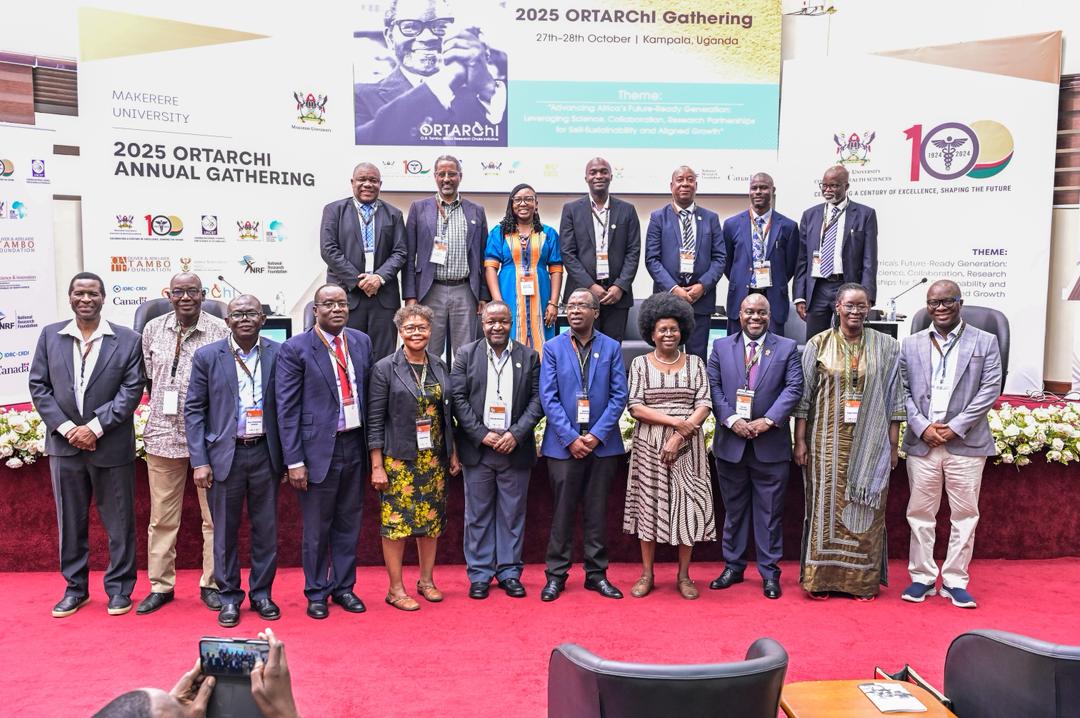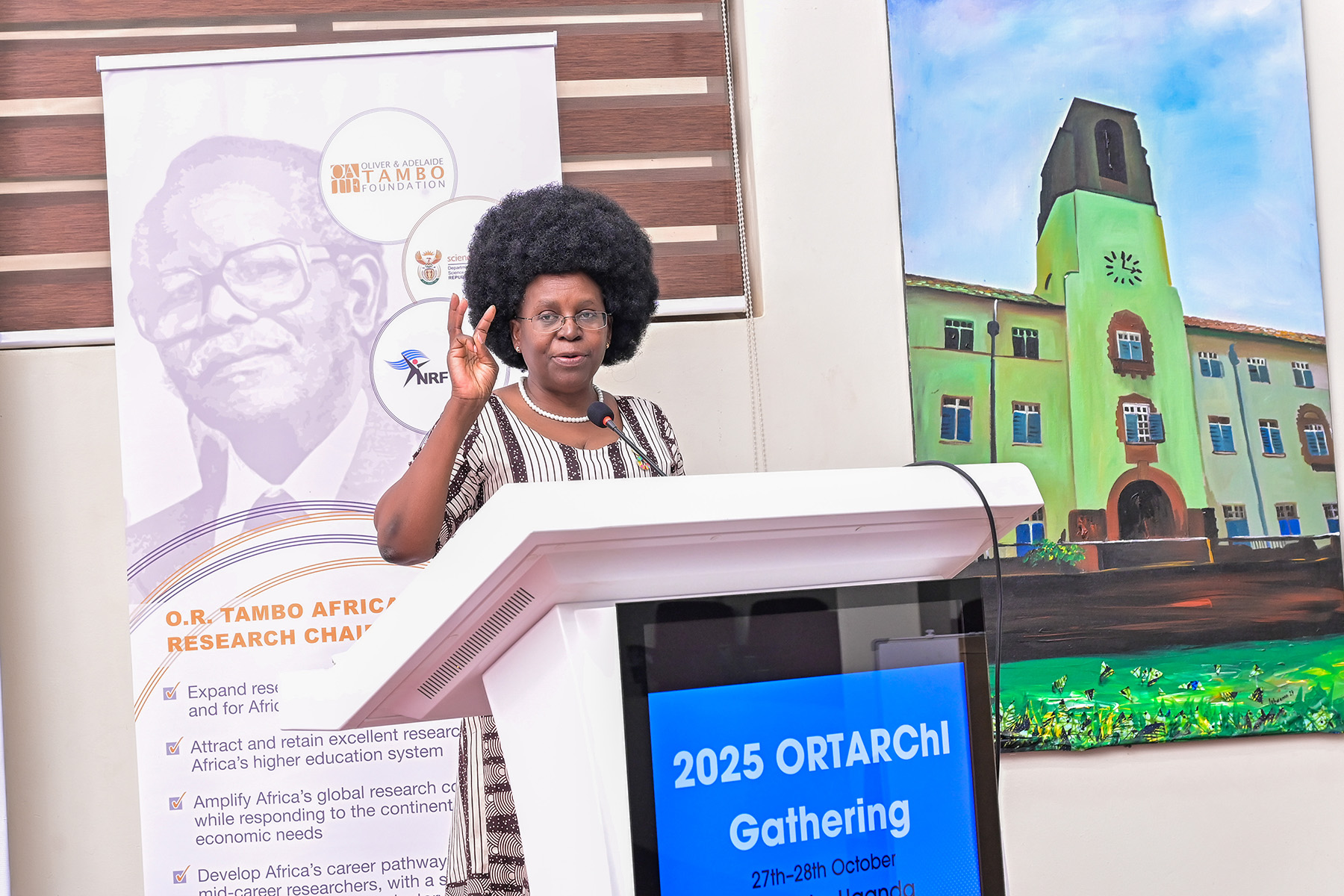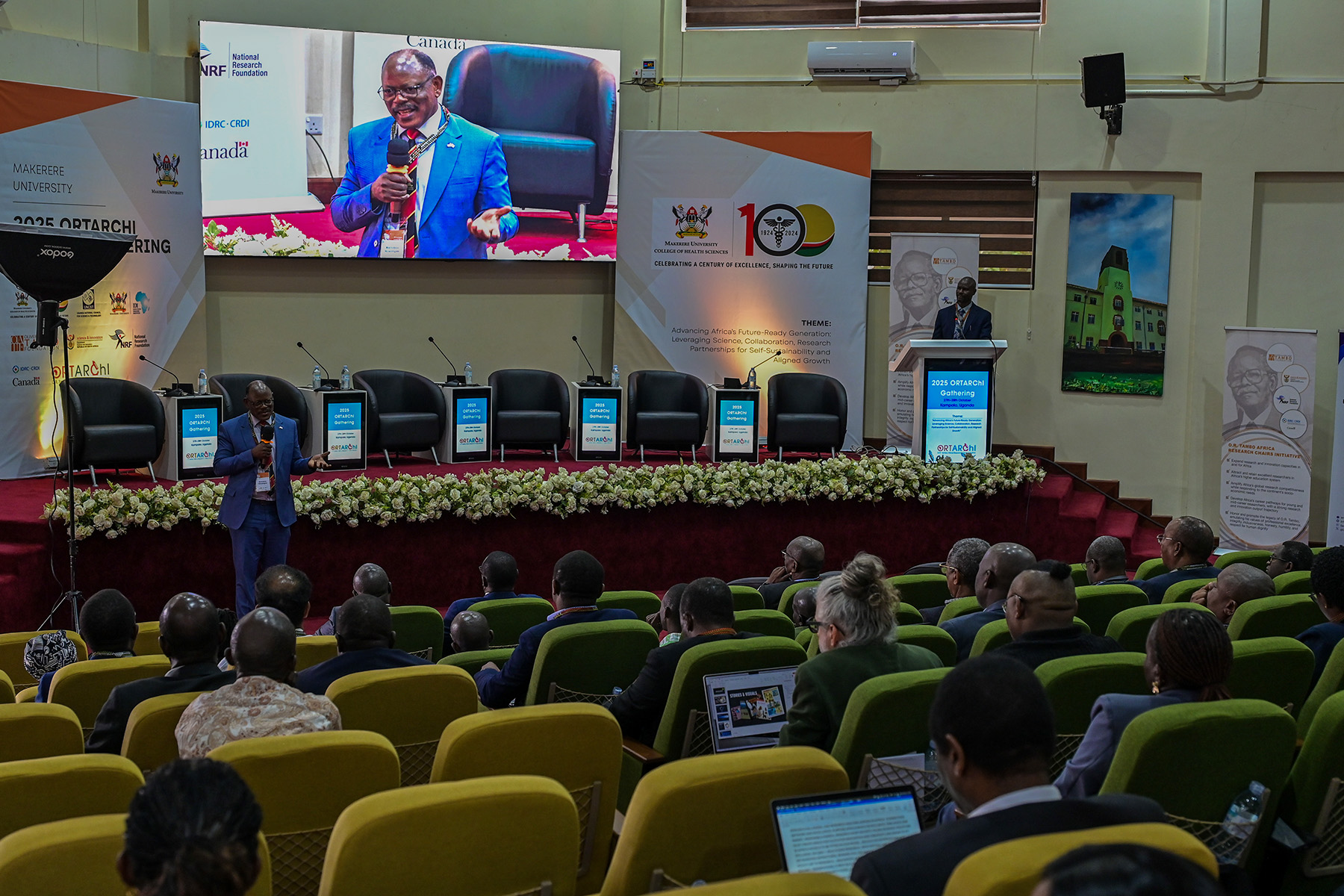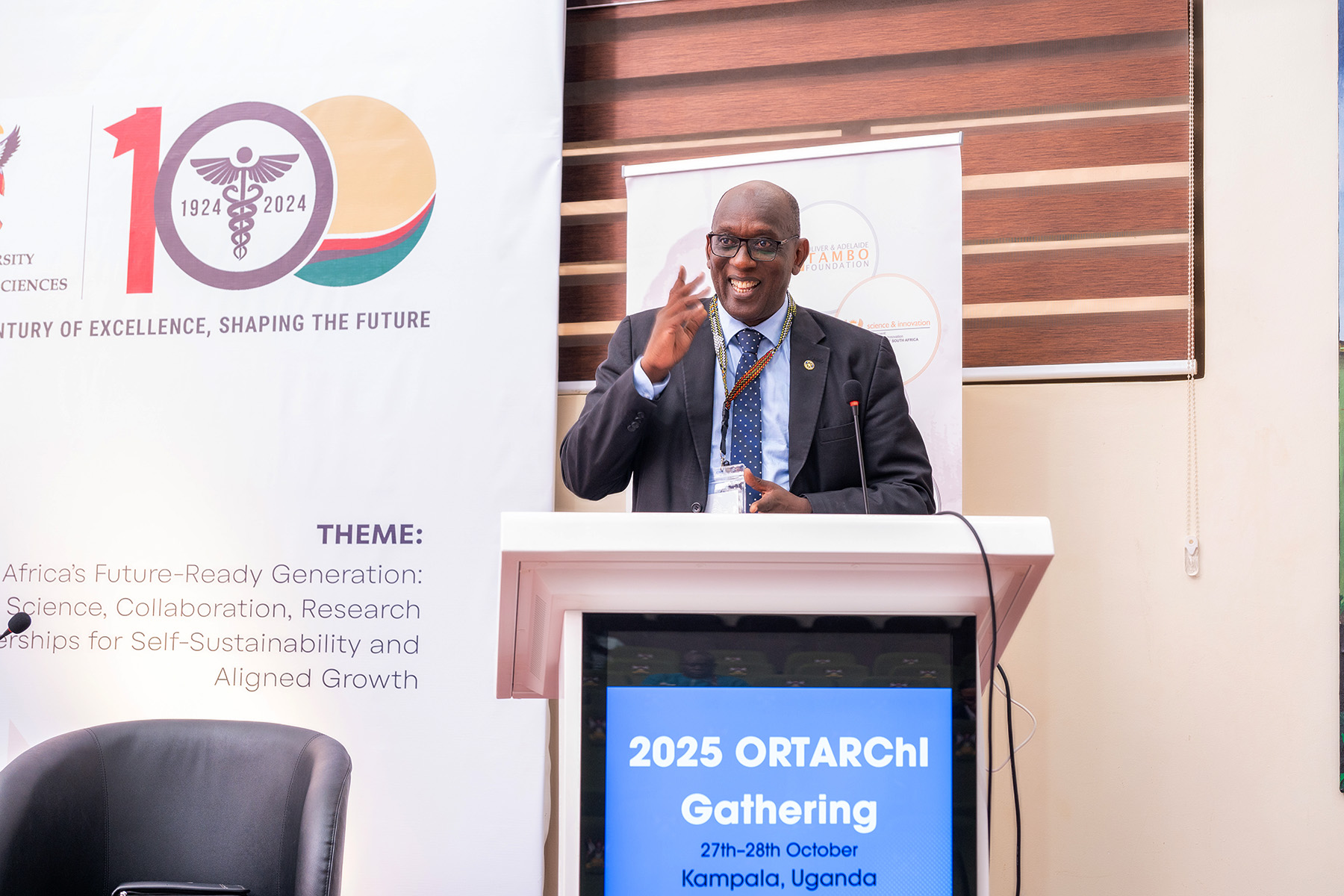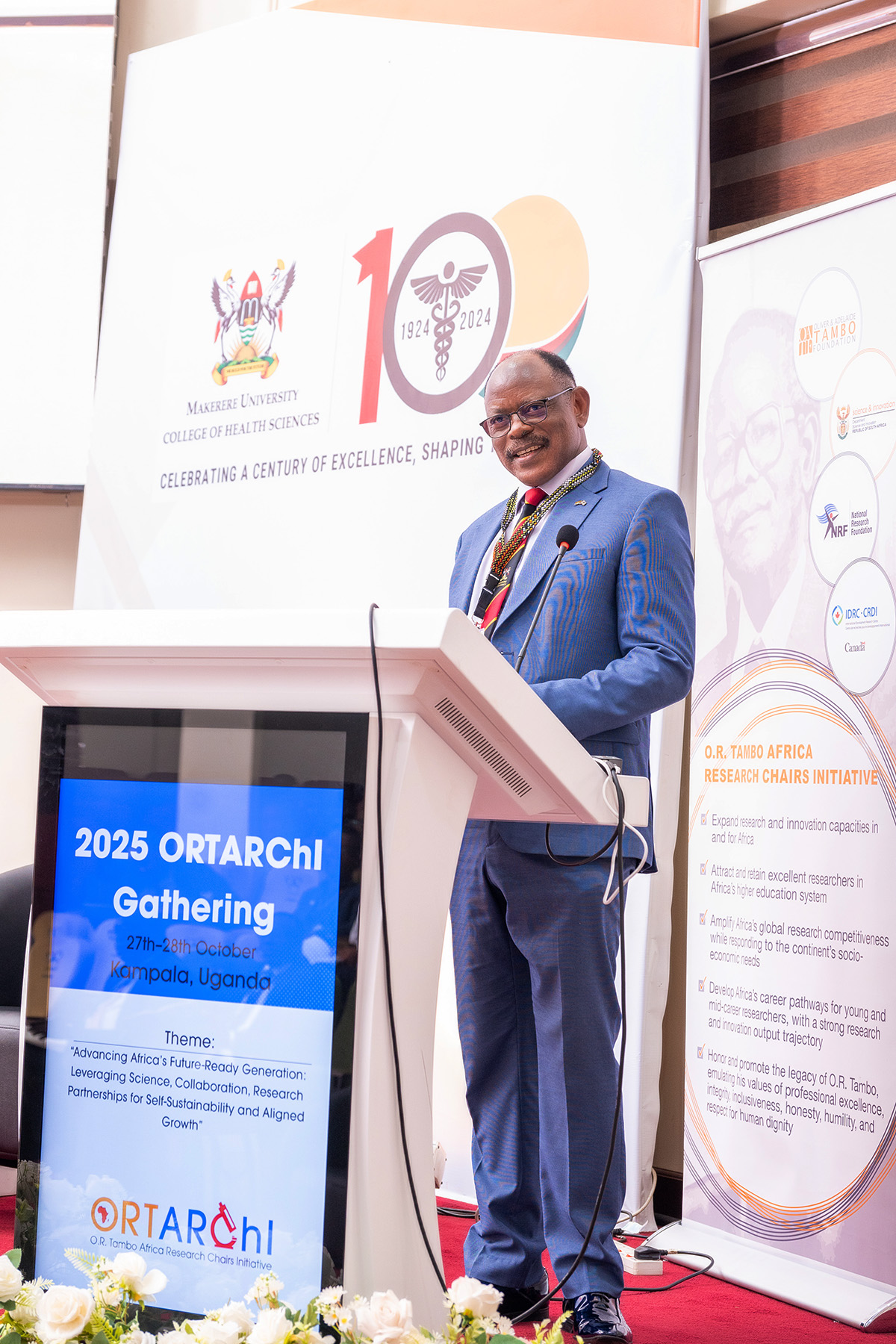At the O.R. Tambo Africa Research Chairs Initiative (ORTARChI) Annual Meeting held 27th-28th October 2025 at Makerere University, Kampala, the Chief Guest, Hon. Monica Musenero – Minister for Science Technology and Innovations called on scientists to translate science to local lingua to be understood by the general population.
ORTARChI was launched in December 2018, aimed at building research and innovation capacity across Africa. The initiative has to-date established 10 Research Chairs in seven countries, addressing critical challenges like climate change, public health, and food security. The seven countries are Uganda, Botswana, Burkina Faso, Ghana, Mozambique, Tanzania, and Zambia. The Uganda Research Chair held by Professor David Bisagaya Meya focuses on infectious and neurological diseases at Makerere University College of Health Sciences.
Hon. Musenero highlighted that at present Africa is like a huge pothole in a road compared to other continents in the context of development, advising that we must look at science as a driver of national development and solution to our challenges.
Calling for translation of science to local lingua the Minister advised, ‘we must realise that science is not to the exclusion of non-scientists. Connect the local population to appreciate how science is a utility in their lives’.
She proposed the following for consideration:
- Collaborate with partners in the northern hemisphere but retain your knowledge and consider it a commodity for wealth creation.
- Science was always considered a product of the elite education system than use in day-to-day life, this must change.
- Other nations rose through making STI a priority. Cognizant of the low investment by governments in sub-Saharan Africa, researchers must engage with policy makers, simplify their results for the later to appreciate the return on investment from research.
- Working in silos will not take Africa far, collaboration on the continent is necessary to produce material useful to us other than remaining consumers of what is produced elsewhere.
- Engineer science and research to build the economies and wealth creation.
‘Africa has excellent labs, publications, presentations at international conferences without protecting intellectual property which translates to professors retiring on pension as opposed to loyalties for their peers in the western world through registration and sale of patents’, Hon Musenero added.
Create think tanks that ‘think’ rather than only research and give to others, recognise knowledge from research as wealth, the Minister further advised.
Hon. Musenero’s parting message to researchers and scientists was: artificial intelligence is going to rule this world, what is Africa’s role and portion?; re-examine whether the research in our institutions is aligned to industries; the new saying should be aligned to protecting our knowledge through a value chain of research-protect-product and then publish as opposed to publish or perish which gives away our knowledge to be used by others; develop pan-African mind-set and networks through benefit sharing; and be intentional in working on what works for us, measure performance by how many products are a result of your research as well as jobs created.
In his remarks, Professor Barnabas Nawangwe, Vice Chancellor - Makerere University welcomed participants to Uganda and Makerere University. He said, ‘this gathering reflects our shared commitment to science as a catalyst for inclusive development, resilience, and economic opportunity across the continent’.
Professor Nawangwe noted that Africa stands at a pivotal moment where a young population are pursuing education with determination, universities are expanding the frontiers of knowledge with collaborating partners enabling the institutions to translate ideas into impact.
‘However, true progress requires more than research excellence. Sustainable ecosystems that translate findings into policy, practice and prosperity are also required’, he reminded the gathering.
He expressed his hope that, conversations at this meeting are not only theoretical but concrete steps toward a self-sustaining research eco-system that aligns with Africa’s growth.
Dr. Ham-Mukasa Mulira delivered a keynote address where he called for stakeholders to advance Africa’s future-ready generation through research innovation and artificial intelligence. He challenged participants to reimagine Africa’s future through strategic investment in knowledge, technology and youth potential.
Some of the issues raised during discussions at the meeting included: Institutional uptake of Research Chairs in Universities in comparison to the research projects; Creation of Communities of Practice of scientists working in same arrears to leverage resources and capacity across borders; African nations should invest more in research and STI which enable the continent to set an agenda which is aligned to their needs; The research chairs introduced on the continent have to be aligned to the abundant natural resources and work towards developing final products for export as opposed to raw materials; Manufacturing capacity of Africa requires improvement and incentives to the private sector to be more responsive in collaborating with researchers in product development; Africa has to move away from business as usual in research with consideration that innovation isn’t random but has to be intentional to the needs of our societies; Acceleration of graduates to be job creators is required as opposed to incubation of idea which has been slow in delivering results; Science communication is necessary to local communities in simple language and engagement of policymakers both in country and regional bodies. Scientists can afford to be apolitical, as decision makers politicians are key partners in whatever is happening in research institutions; Inter-disciplinary collaboration and handholding, for example clinicians working with basic scientists; Identification of gifted scientists for mentorship, training and support through their career paths.
Dr. David Serukka, Ag. Executive Secretary of the Uganda National Council for Science and Technology delivered closing remarks of the ORTARChI gathering. He moved a vote of thanks to all the participants and partners for making the meeting possible.
Dr. Serukka reiterated Hon. Musenero’s message and called on everyone to reflect on the discussions at the meeting. ‘The future for Africa is a digital knowledge economy and we must strive to define what it means for us and how to use it for national development as well as wealth creation’, he said.
He underlined the importance of partnerships, capacity building, concrete steps for sustainability, championing STI to become actors not watchers, protect our knowledge through patents, develop a pan-African mind-set of knowledge sharing and re-examine research around us and which direction to take.
Dr. Serukka thanked the National Research Foundation, South Africa for organising the funding which has catalysed the networks created. He called on all the Chairs under ORTARChI to keep thinking to take us forward.
